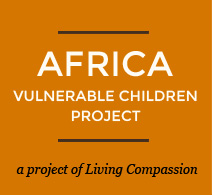We awoke Saturday morning to find there is no water in Northrise—the neighborhood where the guesthouse is located. We are counting ourselves lucky as most of Ndola is without water AND electricity this weekend. There have been power shortages for the last 4 months, and they do what they call load-sharing. They take turns shutting power down to a few neighborhoods at a time. Sometimes you know ahead of time when you will be without power, sometimes you do not. The rumor this weekend had been that most of the city would be without power for most of the weekend. So far so good at the guesthouse.
At nine we called Oswald to take us to Kantolomba. Our first order of business when we got there was to meet with the nineteen women we employ to run our programs. We began the meeting with a gift. A number of weeks ago we discovered a “solar task light” made by a company called Bogo Lights. These flashlights are solar powered and designed to cast a powerful light, bright enough to cook or work by in the dark. They are made with a clip on the top so that they can be hung from the ceiling and light a small room. During the day they can be taken outside and put in the sun to charge. The task lights were made specifically for distribution in the third world. As soon as we saw them we knew we needed to take them to Kantolomba.
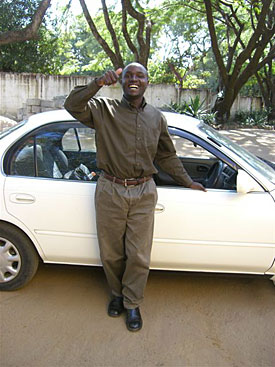
Oswald
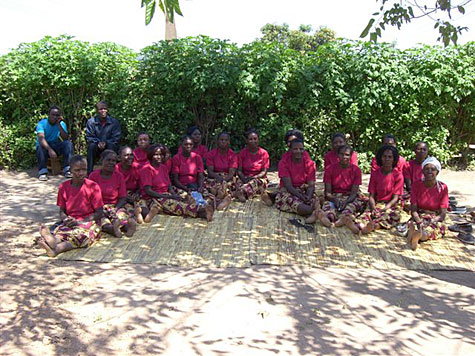
The Living Compassion women in their new uniforms
While Theresa explained, we handed them out one by one. The women were wonderfully pleased and excited. They have spent their whole lives cooking and working by smoky tallow lamps in the evenings—what a difference these lights could make for them! We could not go on to the focus of our meeting until they had all examined their lights thoroughly and set them in the sun to charge. It was like everyone was having a birthday at the same time.
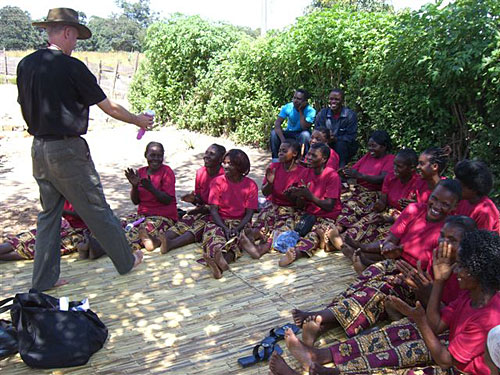
Handing out the task lights
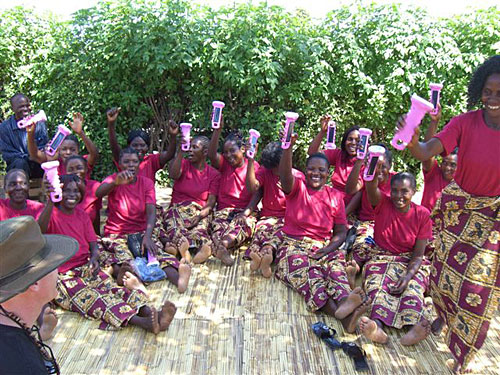
“Look what we’ve got!”
The meeting officially commenced with a continuation of the discussion from the previous day about businesses the women and others might start to bring income into the community. One idea that especially caught our attention was the possibility of making beautiful tie-dye fabrics to sell. One of the women, named Brenda, has learned a technique that produces truly beautiful fabrics that the locals adore. She brought a sample for everyone to admire. We think the designs would do well in America, also. Brenda said she would figure out what size loan a person would need to begin a fabric-dying business.
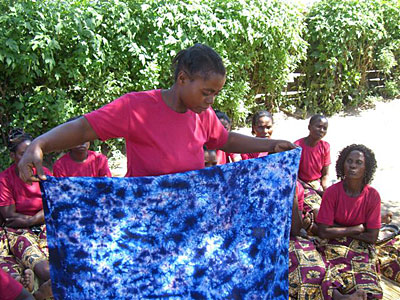
Brenda with her tie-dye.
We are excited about this and the other ideas the women have come up with in the past few days to increase employment in Kantolomba. It is satisfying to us that we are finding ways for people to produce goods that are valuable in Zambia and do not require export to the US. This has been a missing piece: for the community to be able to provide a basic quality of life that is sustainable over time, it needs to function within the local economy and not rely on costly international exporting.
We agreed that the women will work in teams over the next few days to do all the research on each business proposal so that we can bring the details back home with us and find investors. It is an effective, new model of giving that organizations like Kiva have made famous. We are excited to incorporate it into the Living Compassion projects. Stay tuned for more details soon!
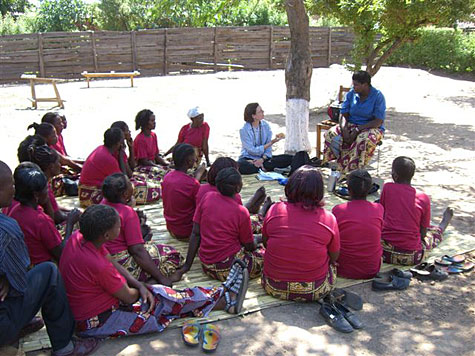
The meeting.
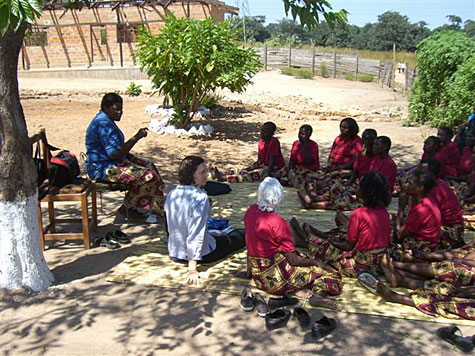
Next on our agenda was to talk about the possibility of providing loans to those who need them to replace the roofs on their houses. We asked how many needed a new roof, and eighteen of the nineteen present raised their hands. Beauty, of course, was the nineteenth. The cost of a new roof is about $640 (2.5 million kwacha). The women proposed that they borrow the money and then pay it back by deducting a small amount from their salary each month. This will clearly work for all involved, and so we all confirmed the deal with an African cheer.
Our plan is to attempt to provide the money for the loans by partnering each of the eighteen women in Kantolomba with a sponsor from the United States. We hope to create profiles for each person so the sponsors can get to know who their money is being loaned to. If you would be interested in participating in this way, just send an email to Africa@livingcompassion.org
Next, we talked about the health issues that face the people of Kantolomba and asked for the women’s ideas about how best to produce educational campaigns that can begin providing the people in the compound with the information they need to be able to take care of themselves. We also discussed in a more general way the needs of the people and what else Living Compassion might do to make a difference. There is much good work to be done.
Before we ended the meeting, we asked if there was anything else people would like to discuss. Evaristo, who had been quietly observing during the meeting, raised his hand. He eloquently explained how important he feels it is to include youth in the development projects in Kantolomba. He rightly pointed out that the age group of 10 to 18 is critical in the community and in many ways are the ones most left behind currently. They are at grave risk for HIV/AIDS, most of them are not in school, many have lost hope. Evaristo said there are many talented young people including musicians and dramatists who could provide an excellent service in spreading the word on some of the education campaigns mentioned earlier. We all wholeheartedly agreed and decided that we would make that a focus of our longer trip in July. We underlined for Evaristo that is will be important for him to begin to enroll his peers into the kind of leadership he has shown in the community, since he will be leaving in late summer to begin his schooling at UWC in Norway.
After the meeting, we walked through the building with Theresa and Veronica to mark on the walls the exact placement of the outlets, light switches and sinks so the plumbers and electricians can finish their work.
And then it was time to throw Dave on the roof. This is a tradition; each time we come, Dave gets up on the roof of the existing building at the property to take video. Our plan is to have a record of the development of the property at all its stages.
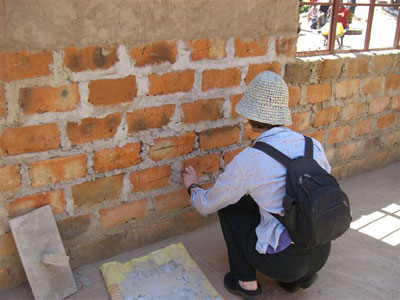
Marking the place for a power outlet.
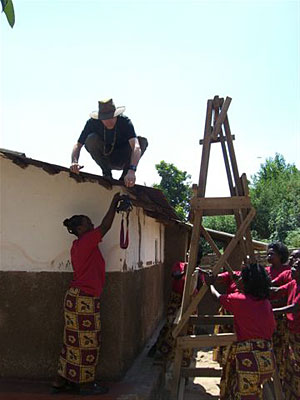
Handing up the camera.
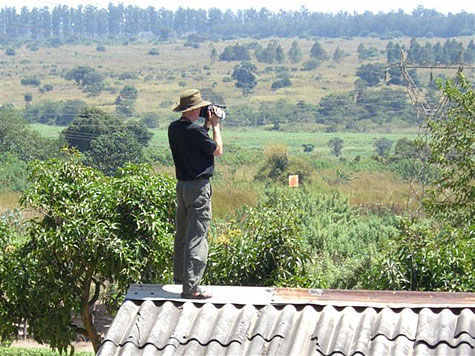
On the roof
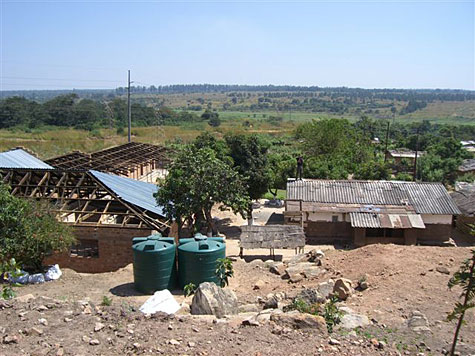
The property from above.
Once we completed our business in Kantolomba, Oswald dropped us back at the guesthouse where we ate lunch before setting out on foot to meet Dr. Obi. Dr. Obi is a Nigerian native now living and working in Zambia. He has been an excellent resource for us in medical matters. He and his nursing staff are the ones who have been doing periodic medical visits out to Kantolomba—constituting the first medical care ever in the compound. We met with him to begin to explore what will be involved in actually opening a medical clinic. There is much to consider and get in order, of course, but we figure we will approach it like we do everything—one step at a time.
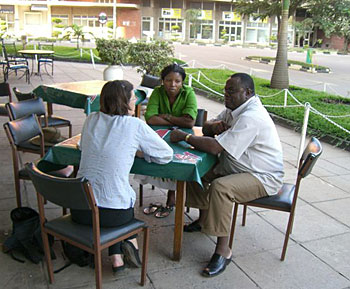
Jen with Dr. Obi and his wife, Carol.
There was still plenty of daylight when we finished our meeting so we decided to walk home; we are saving a bundle on taxis this time! It is one of our favorite things to do—to use the most common local form of transportation—our feet.
Dave cooked us up another simple yet delicious meal, featuring the tofu we toted from the U.S., while Jen caught us up a bit on the blog. We still have electricity (still no water) but the internet is down. We will go in search of an internet connection if it is still down tomorrow.
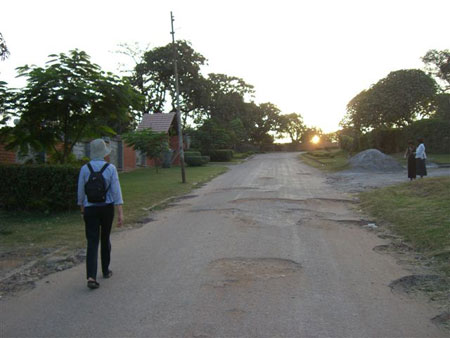
On the way home.
